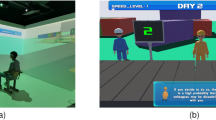Abstract
The present study examined the effects of proactivity on users’ perception of an anthropomorphic user interface agent. The focus was on assessing subjective differences in agent perception between proactive and reactive conditions. Participants of the study were assisted by an interactive agent during seven tasks in a simulation controlling a nuclear power plant. In the reactive condition users had to activate the agent manually in case they needed help. In the proactive condition the agent offered help at a well defined time in the interaction process. Namely when users had confirmed that they were done reading the current task description. The complexity of the simulation ensured that solving the tasks without consulting the agent was virtually impossible. While both conditions performed similarly on objective performance criteria, the reactive agent was perceived more positively than the proactive agent. Especially the reactive agent was rated to be less distracting and less dominant.
Access this chapter
Tax calculation will be finalised at checkout
Purchases are for personal use only
Preview
Unable to display preview. Download preview PDF.
Similar content being viewed by others
References
Lazar, J., Jones, A., Hackley, M., Shneiderman, B.: Severity and impact of computer user frustration: A comparison of student and workplace users. Interacting with Computers 18(2), 187–207 (2006)
Ceaparu, I., Lazar, J., Bessiere, K.: Determining causes and severity of end-user frustration. International Journal of Human-Computer Interaction 17(3), 333–356 (2004)
Lazar, J., Jones, A., Shneiderman, B.: Workplace user frustration with computers: an exploratory investigation of the causes and severity. Behaviour & Information Technology 25(3), 239–251 (2006)
Smith, M.J., Conway, F.T., Karsh, B.T.: Occupational stress in human computer interaction. Industrial Health 37(2), 157–173 (1999)
Lang, H., Dolpp, T., Minker, W.: Evaluation of methods to acquire help with computer problems. Unpublished Raw Data (2012)
Nauman, M., Khan, S., Khan, S.: Helplets: A common sense-based collaborative help collection and retrieval architecture for web-enabled systems. In: Web-based Support Systems, pp. 43–63. Springer, Heidelberg (2010)
Xiao, J., Stasko, J., Catrambone, R.: An empirical study of the effect of agent competence on user performance and perception. In: Proceedings of the Third International Joint Conference on Autonomous Agents and Multiagent Systems, AAMAS 2004, vol. 1, pp. 178–185. IEEE Computer Society, Washington, DC (2004)
Dix, A., Lepouras, G., Katifori, A., Vassilakis, C., Catarci, T., Poggi, A., Ioannidis, Y., Mora, M., Daradimos, I., Akim, N.M., Humayoun, S.R., Terella, F.: From the web of data to a world of action. Web Semantics: Science, Services and Agents on the World Wide Web 8(4), 394–408 (2010)
Rickenberg, R., Reeves, B.: The effects of animated characters on anxiety, task performance, and evaluations of user interfaces. In: Proceedings of the SIGCHI Conference on Human Factors in Computing Systems, CHI 2000, pp. 49–56. ACM, New York (2000)
Xiao, J., Catrambone, R., Stasko, J.: Be quiet? evaluating proactive and reactive user interface assistants. In: Proceedings of INTERACT 2003, pp. 383–390 (2003)
Kim, Y., Baylor, A.L.: Pedagogical Agents as Learning Companions: The Role of Agent Competency and Type of Interaction. Educational Technology Research and Development 54(3), 223–243 (2006)
Baddeley, A.: Working memory. Science 255(5044), 556–559 (1992)
Lang, H., Mosch, C., Boegel, B., Benoit, D.M., Minker, W.: An Avatar-Based Help System for Web-Portals. In: Jacko, J.A. (ed.) Human-Computer Interaction, Part II, HCII 2011. LNCS, vol. 6762, pp. 537–546. Springer, Heidelberg (2011)
Hassenzahl, M., Burmester, M., Koller, F.: AttrakDiff: Ein Fragebogen zur Messung wahrgenommener hedonischer und pragmatischer Qualität. In: Szwillus, G., Ziegler, J. (eds.) Mensch & Computer 2003: Interaktion in Bewegung, Teubner, pp. 187–196 (2003)
Schwarzer, R., Jerusalem, M.: Skalen zur Erfassung von Lehrer- und Schülermerkmalen. Dokumentation der psychometrischen Verfahren im Rahmen der Wissenschaftlichen Begleitung des Modellversuchs Selbstwirksame Schulen, Berlin (1999)
Borkenau, P., Ostendorf, F.: Neo-Fünf-Faktoren Inventar. Hogrefe, Verlag f. Psychologie (1993)
Kipp, M.: Anvil-a generic annotation tool for multimodal dialogue. In: Proceedings of the 7th European Conference on Speech Communication and Technology (Eurospeech), pp. 1367–1370 (2001)
Levene, H.: Robust tests for equality of variances. Contributions to probability and statistics: Essays in Honor of Harold Hotelling 2, 278–292 (1960)
Welch, B.L.: The generalization of student’s’ problem when several different population variances are involved. Biometrika, 28–35 (1947)
Cohen, J.: Statistical power analysis for the behavioral sciences. Lawrence Erlbaum (1988)
Nass, C., Moon, Y.: Machines and Mindlessness: Social Responses to Computers. Journal of Social Issues 56(1), 81–103 (2000)
Lang, H., Minker, W.: A collaborative web-based help-system. In: Proceedings of the 2nd International Conference on Web Intelligence, Mining and Semantics - WIMS 2012, pp. 60:1–60:5. ACM Press, New York (2012)
Author information
Authors and Affiliations
Editor information
Editors and Affiliations
Rights and permissions
Copyright information
© 2013 Springer-Verlag Berlin Heidelberg
About this paper
Cite this paper
Lang, H., Klepsch, M., Nothdurft, F., Seufert, T., Minker, W. (2013). The Influence of Proactivity on Interactive Help Agents. In: Holzinger, A., Ziefle, M., Hitz, M., Debevc, M. (eds) Human Factors in Computing and Informatics. SouthCHI 2013. Lecture Notes in Computer Science, vol 7946. Springer, Berlin, Heidelberg. https://doi.org/10.1007/978-3-642-39062-3_54
Download citation
DOI: https://doi.org/10.1007/978-3-642-39062-3_54
Publisher Name: Springer, Berlin, Heidelberg
Print ISBN: 978-3-642-39061-6
Online ISBN: 978-3-642-39062-3
eBook Packages: Computer ScienceComputer Science (R0)




